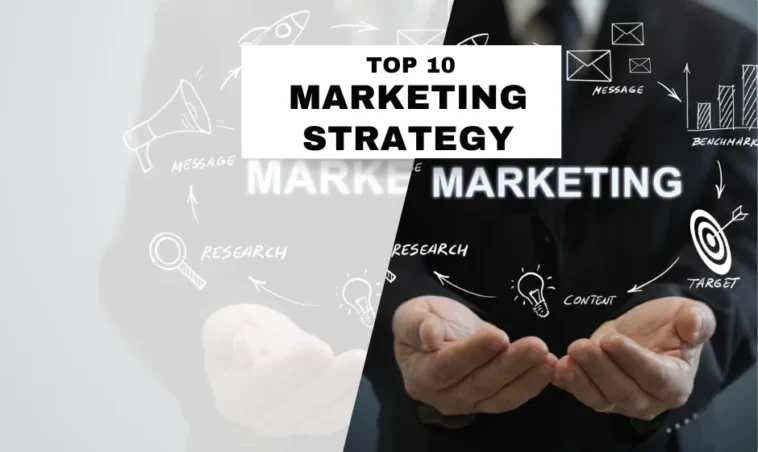Artificial intelligence is redefining the marketing strategy landscape by enabling unprecedented personalization. Tools like predictive analytics and machine learning tailor offers to individual users, increasing conversion rates. Brands using AI in marketing are outperforming competitors by delivering relevant content at the perfect moment.
AI-Powered Content Creation and Optimization
AI tools are now assisting in creating compelling content at scale. Marketers can automate blog creation, video scripting, and email content using AI while maintaining quality and SEO standards. This evolution makes strategy more efficient and data-backed.
Content Marketing as a Core Business Asset
Long-Form Content for Authority Building
Content marketing remains a foundational part of any effective strategy. In 2025, long-form, in-depth content that answers complex user queries will continue to dominate search rankings. Google prioritizes expertise, authority, and trustworthiness (E-A-T), and brands must align accordingly.
Interactive Content to Boost Engagement
Quizzes, calculators, and interactive infographics are becoming content staples. These tools not only engage users but also gather valuable data that fuels a data-driven marketing approach, enhancing personalization and improving ROI.
The Explosion of Short-Form Video ContentDominance of Platforms Like TikTok and Reels
Short-form video is now a must in any digital marketing strategy. Brands leveraging Instagram Reels, TikTok, and YouTube Shorts are seeing exponential engagement. A robust strategy should prioritize video storytelling that aligns with brand voice and consumer expectations.
Video SEO and Shoppable Content
Optimizing videos with proper metadata, captions, and timestamps enhances visibility. Additionally, shoppable videos are bridging the gap between engagement and conversion, a critical move for any modern strategy.
Influencer Marketing Gets More Sophisticated
Micro and Nano-Influencers on the Rise
In 2025, trust and authenticity drive results. Influencer marketing is shifting towards micro and nano-influencers, who offer higher engagement and stronger niche alignment. An agile strategy should include a network of such voices to reach segmented audiences.
Performance-Based Influencer Campaigns
Brands are demanding ROI, leading to data-driven partnerships with influencers. Metrics like engagement rate, click-throughs, and sales conversions are now baked into contracts, merging influencer marketing with a holistic digital marketing.
Personalization Across the Customer JourneyDynamic Content and Adaptive Websites
Personalization is no longer optional—it’s expected. From homepage banners to email subject lines, smart marketing strategies use real-time user data to customize every touchpoint. Adaptive websites that change based on visitor behavior are a competitive advantage.
Behavioral Email Automation
Modern marketing automation systems trigger emails based on specific behaviors, like cart abandonment or content downloads. This tailored communication strengthens relationships and improves customer retention—key aspects of a winning strategy.
Social Media Strategy Becomes Decentralized
Diversifying Across Platforms
Relying on a single social platform is risky. A strong social media strategy in 2025 involves being present across TikTok, LinkedIn, Instagram, and emerging platforms like Lemon8. Diversification helps brands hedge algorithm changes and reach varied demographics.
Community-Led Growth
User-generated content and brand communities are powerful assets. A proactive marketing will include incentives for users to create and share content, enhancing credibility and organic reach.
Data-Driven Marketing for Smarter DecisionsUnified Customer Data Platforms (CDPs)
To fuel a precise digital marketing , companies are investing in CDPs to aggregate data from various touchpoints. These platforms allow seamless segmentation and advanced targeting, enhancing the performance of every strategy initiative.
Predictive Analytics and Forecasting
Data isn’t just retrospective; it’s predictive. Using AI to anticipate trends, purchase behaviors, and content engagement patterns lets marketers optimize campaigns in advance, making data-driven marketing not just smart—but essential.
Sustainable and Ethical Marketing StrategyTransparency and Authenticity as Differentiators
Consumers are aligning with brands that demonstrate ethical practices. A strategy in 2025 must highlight sustainability, DEI (Diversity, Equity, and Inclusion), and transparency in sourcing, messaging, and actions.
Green Marketing and Cause-Based Campaigns
More brands are incorporating social responsibility into their digital marketing. Campaigns centered around environmental impact or charitable efforts foster deeper brand loyalty, especially among Gen Z and Millennials.
Voice Search and Conversational Marketing
Optimizing for Voice Search
With smart speakers in millions of homes, optimizing content for voice is vital. Long-tail keywords, natural language, and FAQ-rich content are now staples of a modern marketing tailored for voice-driven queries.
Chatbots and Conversational Interfaces
Chatbots powered by AI are revolutionizing customer experience. These tools provide 24/7 support, product suggestions, and data collection, contributing to an integrated digital marketing that supports conversions and retention.
Integration of Marketing Automation Tools
Workflow Automation and CRM Integration
Marketing automation platforms like HubSpot, ActiveCampaign, and Marketo are indispensable. They connect email marketing, CRM, social posting, and analytics, making every strategy streamlined and scalable.
Lead Nurturing and Funnel Optimization
Automated workflows that guide leads through the funnel are delivering better results. By leveraging segmentation and personalized sequences, businesses ensure that their digital marketing converts cold leads into loyal customers efficiently.
Zero-Party Data as a Marketing Strategy Game-Changer
What is Zero-Party Data and Why It Matters
Zero-party data—information a customer intentionally shares with a brand—is becoming a cornerstone of a future-ready strategy. Unlike third-party data, which is being phased out due to privacy regulations, zero-party data is obtained through quizzes, preference centers, surveys, and interactive tools. This data is not only more accurate but also reflects a customer’s true intent and expectations.
Building Trust Through Transparency and Value Exchange
Consumers are more willing to share their data when brands offer clear value in return—such as personalized recommendations, discounts, or better experiences. An effective digital marketing now includes clear consent frameworks and a user-first approach to data collection. Brands that focus on transparency and reward-based data exchange will build stronger relationships and higher lifetime customer value.
The Convergence of Sales and Marketing Teams
Alignment for Revenue-Driven Strategy
Gone are the days when sales and marketing operated in silos. In 2025, top-performing companies are aligning these two functions to create a unified strategy that drives consistent growth. Sales teams now rely on marketing insights to close deals, while marketers use sales feedback to refine messaging and targeting. This synergy results in a seamless customer experience across the funnel.
Shared KPIs and Collaborative Tech Stacks
A modern digital marketing integrates CRM tools, sales enablement platforms, and marketing automation software to provide a single view of the customer. With shared KPIs such as lead quality, customer acquisition cost (CAC), and conversion rates, marketing and sales teams can collaborate more effectively. This alignment not only increases efficiency but also boosts overall ROI and customer satisfaction.
Conclusion: Future-Proofing Your Marketing Strategy for 2025
2025 will be defined by innovation, personalization, and ethical engagement. To stay competitive, businesses must adopt a strategy that is agile, data-driven, and integrated with the latest technologies. From AI and automation to sustainability and video content, the trends highlighted above are not just predictions—they are blueprints for success.
To thrive in the evolving landscape, assess your current digital marketing , embrace innovation, and stay responsive to consumer behavior. The future of marketing belongs to those who adapt and act early.





GV777 is a bit of alright! The interface is easy to navigate. I like that. If you fancy a go, give it a whirl here: gv777.
Alright, 66ggplataforma, let’s see what you’ve got. Looks a bit generic, but hey, sometimes those are the winners. Giving it a shot! Check them out here: 66ggplataforma
Alright, searching for ‘gà chọi c1.com’! Praying for a solid stream and awesome fights. Enjoy here gà chọi c1.com.
Okay, 39win! Let’s see what you got. Gonna sign up and see if my luck holds up. You can find it here: 39win!